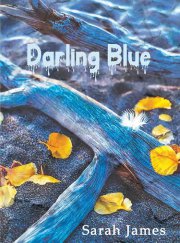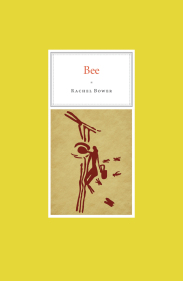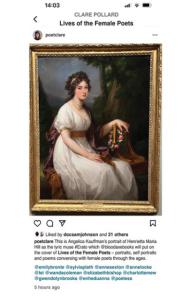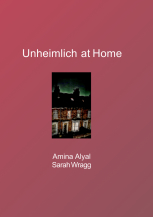
2019
JULY CONTRIBUTORS
Sara Backer, John Bartlett, John Grey, Nat Hope, David Lukens, Julie Mclean,
Todd Mercer, Jeff Newberry, Niall M. Oliver, Holly Peppe, William R. Soldan,
Isabelle Thompson, Mark Williams.
SARA BACKER
Light Sleeper
The green light from the cable box, winking
like the eye of a nebula, bounces messages off the night sky.
The laptop light shines a dot of orange, like transitive Arcturus,
recharging the battery until its light, too, turns green.
From the turned-off TV, a giant red Betelgeuse shoulders
the arm that pulls Orion’s unseen bowstring taut,
mirrored by the red Antares of the phone, the heart
of the scorpion, rivaling the god of war.
The printer beams a blue Sirius, a tiny yet powerful light
erasing all remaining shadows from the room.
This constellation never fades: no darkness arrives to reveal
the abundance of invisible suns our closest sun outshines.
Come morning, the restless sleeper leaves the curtains closed
and opens large screens of light.
Sara Backer earned an MFA from Vermont College of Fine Arts and has two poetry chapbooks: Scavenger Hunt and Bicycle Lotus (which won the Turtle Island Poetry Award). Recent publications include Qu, Nonbinary Review, Journal of Compressed Creative Arts, Moria, and Hawaii Pacific Review. Website:sarabacker.com.
Back to POETRY ARCHIVE
JOHN BARTLETT
The call of the Border
When murder
knocks on the door at night.
When home
is a ticking time-bomb
When despair
is all that is left to eat
Only fools
snatch their children from sleep,
secrete them on boats
in the dark
Only fools
leave homes still on fire
murdered loved ones unburied
Only fools heed the call of the border
like migrating birds
oblivious to borders
The true border
lies within the soul
halfway between courage
and extermination.
John Bartlett is the author of three novels, Towards a Distant Sea, Estuary and Jack Ferryman: Reluctant Private Investigator, as well as All Mortal Flesh, a collection of short stories and A Tiny & Brilliant Light, his published non-fiction. His poetry has been published in a number of Australian and overseas journals. In June 2019 Melbourne Poets Union published his Chapbook The Arms of Men as part of the Union Poet Series Chapbook. beyondtheestuary.com
Back to POETRY ARCHIVE
JOHN GREY
Hank's Garage
Sun retreats,
the garage's response
is a dingy bank of lights.
Enough to work by.
These men in grubby overalls
go where their fingers take them,
not their eyes.
A car rests on blocks.
One worker slithers underneath.
Another scours a bin full of bolts
for one that fits the screw
on his other hand.
Miss May adorns the office wall
in all of her semi-naked glory.
The boss sets aside a day's scrawl receipts
to open a box, unfold a wrapper,
manipulate the remains of a sandwich
from the one clean spot on his palm
into his mouth.
On his desk,
a metal Indian head
from a long-forgotten oil company
acts as a paper-weight.
In a bottom drawer,
a bottle of cheap whiskey
also holds down
what it can, when it has to.
It's sunset.
Attention might be better off
on the long-legged beauty
strutting down the sidewalk
or the distant hillside glowing red and orange.
But the world's stopped in at Hank's garage
like it needs a tune up and oil change
before moving on.
Of course, there's no one called Hank here.
But nor is there a world that pays the least bit of attention.
John Grey is an Australian poet, US resident. Recently published in That, Muse, Poetry East and North Dakota Quarterly with work upcoming in Haight-Ashbury Literary Journal, Hawaii Review and the Dunes Review
Back to POETRY ARCHIVE
NAT HOPE
Dolphins
In late afternoon
we cast long shadows
across the sand
as we walk side by side.
We talk of clothes, food and Autumn.
I try to ask you how you are
as I do every day
and you tell me you’re okay
as you do every day.
You move away into the sea and look back once
and then you watch black shapes that tumble and roll with the waves.
Dolphins. You point.
Dolphins. I follow your gaze.
And then you dive
and your skin silvers
and you click and whistle
and dip a fin and flip a tail
and tumble and roll with the waves.
I should have told you
how I would bind your feet in broidered straps
I should have told you
how I would plait abalone in your hair
I should have told you told you
how I would weave a robe of pure sea silk
I should have told you
how I would knot it too tight to unwind.
Daughter again
you step from the sea
stars skitter like unfettered sequins in your wake.
As darkness settles
you take my hand
and I will not cast my eyes back to see
black rocks that tumble and roll with the waves.
Nat Hope was born in Yorkshire, but now writes and works in
Italy. She recently completed an MA in Creative Writing at Manchester Metropolitan University.
Back to POETRY ARCHIVE
DAVID LUKENS
The Weight of History
It used to be a cinema, in the days when every town had one.
A pair of Doric columns, double doors propped open,
leaking darkness into the busy street.
Inside, one room runs for ever - half the length
of a football pitch at least. The back door opens on to fields.
No stalls remain, plundered long ago for springs and velveteen.
Vic, the doyen of house clearances, finds it difficult to say no.
He cannot face a tearful relative and tell the truth -
It's all rubbish really but I'll take that mirror off your hands.
Daytime he broods by the till; above him the furniture creaks
in teetering towers: sideboards stacked on chests, chairs hooked
on coat stands, the only space a narrow central aisle.
At night, he wanders round the shop, stopping
at his favourite pieces to stroke a joint or admire
the depth of patina. History comes out to meet him.
The poet whose sonnets had lain for years unnoticed
in a Georgian desk before Vic found them. The ballerina
searching her make up case for its cache of drugs.
When he is out collecting, Vic's wife swings the axe
and feeds the pot-bellied stove with furniture, a betrayal
he is too kind to mention. Instead, he makes sure the items
nearest the stove are modern tat with chipped veneers.
And he comforts her in the night when she wakes, wet with fear
from her dream of dying in a landslide of other people's lives.
David Lukens lives in Wiltshire and has worked in business and IT. He started writing late, coming to poetry via novels and has been published in magazines such as Acumen, Brittle Star, Butcher’s Dog, The Interpreter’s House and Under the Radar. “The Weight of History” was first published in Butcher’s Dog, 4, Autumn 2014.
Back to POETRY ARCHIVE
TODD MERCER
Almost Every Apartment for Rent in Beer City
The sink is burled New Hampshire granite,
the countertops marble, the floor Italian travertine.
The hammered copper light plates were shipped in
from Poland where an old man hand-forms them
in the styles of his ancestor-craftsmen before him.
All sound stops dead at the high-index polymer
ceiling tiles, the same ones NASA uses.
Nice gas stoves with built-in griddles.
Triple-filtered water sprays in the shower enclosure,
pulses and dances from all directions
at the touch of a button, or on verbal command,
as the built-in Alexa-thing is always listening.
These apartments offer residents everything
except a reasonable rent-to-income ratio.
The floorplan is nearly identical to the other
recently constructed stock. It’s two or three hundred
square feet of “affordable” luxury. No word on where
poorer folks can live, but these shoeboxes
couldn’t hold more needless swank,
more up-market accents. They sure aren’t
for everyone, even though they’re everywhere.
Todd Mercer was nominated for Best of the Net by in 2018. His chapbook Life-wish Maintenance is posted at Right Hand Pointing. Recent work appears in: A New Ulster, Clementine Unbound, Mojave River Review and Star 82 Review.
Back to POETRY ARCHIVE
JEFF NEWBERRY
My Father’s Shadow
As a boy, I trailed behind on hot days,
hiding from the bright sun, secure
in the cool caul of his cast silhouette,
where I tried to fit my body into his mold,
my head into his place like a carnival
cut-out. There, I couldn’t see his squint
or the red sheen on his forehead,
the sweat that ran from his hairline
down his cheeks like salted tears.
There, the burning heat stayed at bay.
I couldn’t cast my own shadow there.
One day, I’d have to walk into the light
and bear the heat on my own. No more
hiding the lea of his ambling stone.
But then? I followed, walking on his back,
trying so hard to disappear into him
Jeff Newberry's most recent book is a collaboration with the poet Justin Evans, Cross Country (WordTech Editions, 2019). He is the poetry editor of Green Briar Review.
Back to POETRY ARCHIVE
NIALL M. OLIVER
Magic at the morning market
He appears to choose randomly,
my dad, reaching into the basket
with his finger and thumb
to reveal a single red apple.
Placing it on his open palm,
he holds it out for us to look
as if a crystal ball
that any second might levitate.
Sweet as a bell in a wood,
he says, before tossing
for the grocer to catch,
and through the air, it sparkles.
Niall M Oliver is an Irish born writer who lives in London with his wife and two boys. He takes inspiration from his roots and everyday life, and has previously been published in a couple of anthologies but has yet to meet anyone who claims to have read them.
Back to POETRY ARCHIVE
HOLLY PEPPE
Vienna, 1933
At seventy-seven, Freud
spoke flawless English,
placed a small, bronze statue
of Pallas Athena
on his palm,
calling her “imperfect
because she had
lost her spear.”
To reclaim her place
in the Professor’s scheme,
she must wince or break:
she did not.
Nor had mighty Zeus winced
or broken apart
when she sprang
from his head-womb
armed for war.
But for wings
she was one with angels,
but for a spear,
one with Freud.
Holly Peppe taught poetry, literature, and writing for many years in high schools and universities in the U.S. and Italy. Literary executor for the Jazz Age poet Edna St. Vincent Millay, she has written and lectured widely about Millay’s life and work. Her own published writing includes poetry, translations, critical essays, and biographies.
Back to POETRY ARCHIVE
WILLIAM R. SOLDAN
Back in the States
At the border, they take drills to our doors,
everything short of greasing up a rubber glove.
The mosquitoes are ferocious, drink their fill
as we plow south down potted two-lane,
a buzzing cloud seething around the cab, our things—
books, clothes, trinkets made or traded for—tossed
by careless hands.
The road parts sleeping grassland country like
a zipper or an unstitched seam, body around it
soaked in moon glow, the ridge and hollow of a hip
or the slope of soft shoulder spied through a midnight curtain.
Then he hits a fox at fifty-five, and we spend an hour
in a field, among the sway, believing it’s still alive.
His spirit animal, or someone else’s.
Some believe that to see a fox at the start of a journey
is a bad omen, he says.
But we’ve been out here for many weeks now,
and besides, it’s dying, even dead.
But they’re said to inspire swiftness of mind and body, too,
he says, and shrugs.
So what does any of it mean, I ask, if everything means anything?
We never find it, not even its trail.
We drive until we find the sun,
or it finds us.
William R. Soldan is a writer from the Ohio Rust Belt and the author of the story collection In Just the Right Light. His work has appeared is such publications as Neologism Poetry Journal, Jelly Bucket, Bending Genres, Gordon Square Review, and many others. You can find him at williamrsoldan.com if you'd like to connect.
Back to POETRY ARCHIVE
ISABELLE THOMPSON
The Facts
For Friedl Dicker-Brandeis, the art teacher of Theresienstadt
– murdered at Auschwitz on the 9th October 1944.
There were art lessons at Theresienstadt.
A prisoner held art lessons for the children.
She filled her suitcase up with art supplies
and the children sat and painted pictures.
A prisoner held art lessons for the children
in a stark-windowed building at the camp,
and the children sat and painted pictures
of blue butterflies and rabbis flying.
In a bleak-windowed building at the camp,
children painted small red houses with trees,
blue butterflies and long-robed rabbis flying,
clutching Torah scrolls in clamp-closed mouths.
Children painted houses overhung with trees,
eels and anemones slipping through murk,
scrolls of weed clutching mouthless creatures.
15,000 children were prisoners in the camp;
girls and boys sunk down within the murk.
Only 150 survived
of 15,000 imprisoned in the camp.
Their teacher saved 4,500
pictures – two cases full of art supplied
by children who did not survive
though 4,500 paintings were made
in art lessons held at Theresienstadt.
Isabelle Thompson is studying for an MA in Creative Writing at Bath Spa University. She has previously been published in Ink, Sweat & Tears.
Back to POETRY ARCHIVE
MARK WILLIAMS
In the Blue Box
In the last thirty days I have finally found
a reliable concrete man to patch our driveway.
I have called a noted arborist to diagnose
the sickly dogwood tree in our backyard.
I’ve taken my uncle to the grocery
and our beagle to a chiropractor.
I have driven to a bookstore to purchase
a birthday card for my wife
and to my mother’s apartment
when she didn’t answer my call that morning.
I have obeyed my chest-congested, slightly confused,
eighty-five-year-old mother, leaving her alone
when she gasped, I don’t want you to see me this way—
meaning she’d overslept and not dressed,
fixed her hair, or put on make-up. I have driven home,
cleaned my neglected office, and rested on my sun porch,
where half-way through a cup of coffee
I remembered to give my mother another call,
this time finding her too breathless to speak.
I’ve bounded up fifteen steps,
forced her down as many, and
witnessed what I feared to be her final breath—
her head drooping like a wilted flower in my car.
I have run a red light, zoomed
into my smooth, newly-repaired driveway,
and given my mother chest compressions
while my wife breathed into her mouth.
I’ve called my sister in Illinois, my brother in Oregon,
and repeated my mother’s instructions
to an ER doctor who removed a breathing tube.
I have seen our redbud bud, azaleas bloom,
and my mother in an ICU come miraculously to.
I have had my hair cut.
I’ve eaten a birthday dinner with my wife
and tuna sandwiches in the hospital lunchroom with my sister.
I’ve discovered how to lose weight
the pleasures of caffeine,
and my mother alone in her hospital room after a massive stroke.
I have seen pain in her eyes when she mumbled,
I’m sorry you have to see me like this
and joy when they opened for a last time to her children.
I’ve had a wonderful life, my mother said.
I have been stood up by the noted arborist
and tapped on the shoulder by a funeral home director
at the mausoleum service. I’m sorry to tell you, he said,
but the cemetery says you owe another dollar ten cents.
I have felt the joy of anger being released.
I’ve ridden in the back seat of a hearse
and driven my five-time married, terminally-ill uncle
to divorce court in his Chevy van,
stopping only to snatch a wheelchair (A wide one!
he commanded) from an unattended clinic foyer.
I have pushed my uncle in a stolen wheelchair
past security into a courtroom.
I’ve eased him into a La-Z-Boy recliner in his den—
his feet the size of cantaloupes, legs thin as vines,
a snake of tube uncoiling from his nose
to a tank of gurgling oxygen in the hall.
Life, I heard my uncle say
as my cousin Julie stepped into his kitchen.
Life, I heard him say again.
In the blue box. And with peaches.
I’ve written one obituary, two eulogies, a large check,
twenty-four thank you notes, about that many emails,
and I’ve almost called my mother on the phone
at least three times. In the last thirty days
I have seen our dogwood clench its leaves like fists.
King of Albania
Lately, I’ve been thinking about Otto Witte—
German lion tamer/circus acrobat whose extraordinary magic skills
earned him an honorary chieftainship in an African Pygmy tribe
before he eloped with the Emperor of Ethiopia’s daughter. Otto, who in 1913,
while sword-swallowing his way through the Balkans,
discovered he resembled a certain Turkish prince
whom Albanian Moslems had asked to be their king—
Otto’s cue to grab a uniform, pin some medals,
and proclaim himself King Otto I
before declaring war on Montenegro,
raiding the treasury, and escaping the country.
Or so he claimed—
all the way to his not-at-all bitter end in a Hamburg home for the aged,
where Otto clung to his fantasies and an identity card
issued by well-meaning German police.
Otto Witte
Entertainer
Former King of Albania
I’ve been thinking about Otto Witte—
how we could all use a little pseudologia fantastica.
If only you believed you eloped with Ethiopian royalty,
that you ruled Albania and Montenegrins feared you.
If only you believed you were happy.
Mark Williams' poems have appeared in The Hudson Review, The Southern Review, Able Muse, Rattle, Nimrod, The American Journal of Poetry, New Ohio Review (online), and the anthology, New Poetry From the Midwest. Finishing Line Press published his poem, "Happiness," as a chapbook in 2015. He lives in Evansville, Indiana. “In the Blue Box” first appeared in the eBook anthology, The Burden of Light: Poems on Illness and Loss (Smashwords) in 2014
Back to POETRY ARCHIVE



